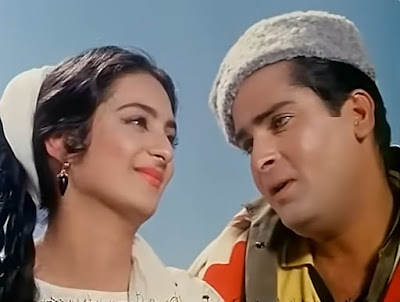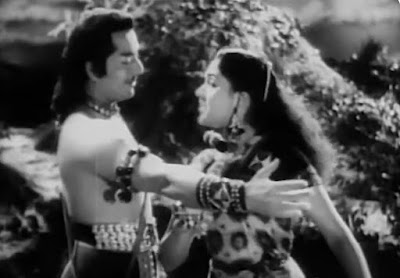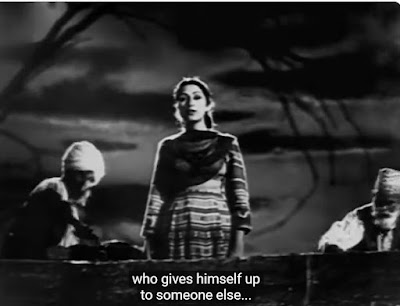2024 ended on a horrible note for us here in the US and the repercussions will continue to reverberate for the next four years or more. But in the context of this blog which usually eschews politics (though my political bearings influence my writing) let me take a moment to remember the great many luminaries from the arts: literature, music, movies, radio – Ameen Sayani, Kumar Shahani, Shyam Benegal, Pankaj Udhas, Zakir Hussain, MT Vasudevan Nair, Bapsi Sidhwa, etc., whom we lost this year.
However,
this is a new year, and hopefully, a new beginning (redundant, I know). I am grateful to the readers who still read my posts, old and new. Without you, there wouldn't be a blog. So, a wish for a very Happy New Year, from me and mine, to you and yours. May the world be a happier place, may there be less strife. May we be compassionate and kind and share laughter and happiness.
I must confess, however, that I have no wish for 2024 to ‘come back’ in any way, shape or form. ‘Goodbye’ is a perfect way to bid farewell to a year that were horrible, terrible, no good, very bad one. But, since this is the first post of the year, I decided it would be apt to post a list of songs that do just that: songs that bid either au revoir or goodbye – to lovers, to moments, to life.
Mere yaar
shab-ba khair
Junglee
(1961)
Singer: Lata Mangeshkar, Mohammed Rafi
Music: Shankar-Jaikishan
Lyrics: Hasrat Jaipuri
This
is the song that kickstarted this list. A very young and very beautiful Saira
Banu, a charming, handsome Shammi Kapoor and a more than decent plot made Junglee
a very entertaining watch. In this song, Rajkumari (Saira Banu) is trying
to return home in the evening. But Sekhar (Shammi Kapoor) is loth to let her
go. She reminds him that they had spent the whole day together and begs him to
let her leave before evening turns to night. It is a teasing, playful,
affectionate song between two lovers who are soon to be parted.
O dilbar dil toh kahe teri rahon ko rok luun main
Aayi birha ki rat ab batla de kya karuun main
Yaad aayengi ye baatein tumhari
Tadpegi mohabbat hamari
Mere yaar shab-ba khair, mere yaar shab-ba khair
Din sara guzara tore angna
Ab jane de mujhe more sajna
Ho mere yaar shab-ba khair, mere yaar shab-ba khair
Abhi na jao chhodkar
Hum Dono (1962)
Singers: Mohammed Rafi, Asha Bhosle
Music: Jaidev
Lyrics: Sahir Ludhianvi
Dev
Anand obviously doesn’t feel the same way as me. “Don’t go,” he says, but then,
if 2023 or 2024 had looked like Sadhana, perhaps I would agree with him too. Don’t
go, he tells her, for he hasn’t had enough of her company.
Abhi toh kuchh kaha nahin
Abhi toh kuchh suna nahin
Abhi na jaao chhodkar
She,
on the other hand, is determined, for if she stays now, she’ll never be able to
leave. And as the couple dispute whether to stay or leave, we get to listen to
this beautiful song that simply distils love into its purest form.
Bas ab na mujhko tokna, na badhke raah rokna
Agar main ruk gayi abhi toh jaa na paaoongi kabhi
Yahi kahoge tum sada ke dil abhi nahin bhara
Jo khatm ho kisi jagah ye aisa silsila nahin…
Sayonara
Love in Tokyo
(1966)
Singer: Lata Mangeshkar
Music: Shankar-Jaikishan
Lyrics: Hasrat Jaipuri
Well,
here’s a cheery goodbye for a change. Explicit in her goodbye message is a promise
to return the very next day. (Don’t listen, 2024!) But for now, she pleads, don’t
stop her from leaving.
Chhod de meri baahon ko
Rok na meri raaho ko
Itni bhi betaabi kya
Samjha apni nigaahon ko
Phir miloge kabhi
Ye Raat Phir Na Aayegi (1966)
Singer: Mohammed Rafi
Music: OP Nayyar
Lyrics: SH Bihari
Another farewell, and another plea to not do so. Here, he asks her when she will meet him again, and begs her to promise she will. Their conversation is incomplete, he has so much more to tell her. Won’t she come again? Won’t she promise to spend a few more moments with him? Dil ki har baat adhoori hai adhoori hai abhi
Apni ek aur mulaaqaat zaruuri hai abhi
Chand lamhon ke liye saath ka va’ada kar lo
Humse ek aur mulaqaat ka va’ada kar lo
Jadugar sainyya
Nagin
(1954)
Singer: Lata Mangeshkar
Music: Hemant Kumar
Lyrics: Rajinder Krishan
It’s
a reluctant farewell, because he refuses to let her go. She must resort to
pleading with him to do so because it’s midnight and she must return home. Or
her friends will taunt her absence. I promise to return tomorrow, she tells
him, just let me go now.
Jhuki-jhuki
ankhiyaan dekhegi saari sakhiyaan
Degi taana tere naam ka
Aise mein mat rok bedardi
Le le vachan kal shaam kaa
Kal honge phir hum saath
Ab ghar jaane do
Aaj ki mulaqaat bas itni
Bharosa (1963)
Singers: Lata Mangeshkar, Mahendra Kapoor
Music: Ravi
Lyrics: Rajinder Krishan
This
song follows the same trajectory – the lady wants to leave, and she promises to
meet him again the next day. It isn’t good to be so stubborn, she tells him,
but will he listen? He wants her to wait until he can gain some control over
his emotions; he has barely understood what love is, won’t she wait until he
can explain it to her as well?
Thehro main
dil ko sambhaloon zara
Palkon me tumko chhupa loon zara
Samjhe na ab tak mohabbat hai kya
Aao tumhe ye bhi samajha doon zara
Achha toh hum chalte hain
Aan Milo Sajna
(1970)
Singers: Lata Mangeshkar, Kishore Kumar
Music: Laxmikant-Pyarelal
Lyrics: Anand Bakshi
These
lovers are a little more pragmatic in their approach. Alright, I’ll take your
leave, she tells
him, and he responds with a query – when will she meet him again?
Tomorrow? No, on Friday. At midnight. But, he’s cautious – did anyone see her coming
to meet him? No, she says, I sneaked out. But now it’s late and she’d better
get going! And if he has anything to tell her, do it soon, instead of complaining
that she left too soon.
Kisi ne dekha toh nahi tumhe aate
Nahi main aayi hoon chupke chhupaake
Der kar di badi, zara dekho toh ghadi
Uff! O meri toh ghadi band hai
Teri ye ada mujhe pasand hai
Dekho baate waate kar lo jaldi jaldi
Phir na kehna abhi aayi abhi chal di
Khuda nigahbaan ho tumhara
Mughal-e-Azam (1960)
Singer: Lata Mangeshkar
Music: Naushad
Lyrics: Shakeel Badayuni
The
time for fun and games is over. Matters are bound to get serious when a lowly
court dancer dares to fall in love with the crown prince. She’s sentenced to
death, and it’s only because the emperor has been compassionate that she gets
to spend one last night with him. Now, as the guards take her away to be
executed, her still-beating heart pleads with God to protect her lover. She’s
leaving to meet her death, and is offering her final salutations to him, along
with an exhortation not to lend a shoulder to her bier.
Kasam hai tumko na dena kaandha
Na ho mohabbat hamaari ruswa
Ye aansuon ka payaam le lo
Kar chale hum fida
Haqeeqat (1964)
Singer: Mohammed Rafi
Music: Madan Mohan
Lyrics: Kaifi Azmi
A
final farewell from the dozens of soldiers who have given their lives to
protect their motherland; they are leaving her in the care of those who will
come after them. Their breaths have stilled, the blood in their veins has
spilled, yet that had not stopped their feet from moving forward. Their heads
have been severed, but they die content, knowing they didn’t allow the enemy to
cross the mighty Himalayas. And now, the onus is on those following to not let
their sacrifices go in vain.
Raah qurbaaniyo ki na viiraan ho
Tum sajaate hi rehna naye qaafile
Fateh ka jashn is jashn ke ba’ad hai
Zindagi maut se mil rahi hai gale
Aaj dharti bani hai dulhan saathiyo
Ab tumhare havaale vatan sathiyo
Alvida
Anarkali
(1953)
Singer: Lata Mangeshkar
Music: C Ramchandra
Lyrics: Rajinder Krishan
Another
farewell, another song, before she’s ready to breathe her last. Anarkali is
being walled alive on the orders of Emperor Akbar – she, the court dancer, had
dared to love Prince Salim. And as he frantically rides to stop her being confined
to her stone grave, she sings her final farewell – alvida… Her voice
rings through the skies, causing even the angels to weep; her last wish to see
him but once.
Ae zindagi ke shaam aa
Tujhe gale lagaaoon main
Tujhi mein doob jaaoon main
Jahaan ko bhuul jaaoon main
Bas ik nazar mere sanam
Alvida… alvida…
The
next two songs are from more recent films, but bare the same message of leave
taking, though the emotions differ.
Ae jaate hue lamhon
Border
(1997)
Singer: Roop Kumar Rathod
Music: Anu Malik
Lyrics: Javed Akhtar
He’s
a soldier returning to the front, a man who’s just married and can’t bear to
leave behind his new bride… he has but a few hours to spend with her before he
must leave. He begs time to stop, to let him speak his heart out to her, and
then, yes, he will leave. Once he has absorbed the essence of her – the softness
of her face, the darkness of her hair, the brightness of her eyes and the redness
of her lips – once he’s stored them deep in his breath, in his eyes, in his
dreams and his remembrances, and in his heart, he will leave.
Ae jaate hue lamho
Zara thehro zara thehro
Main bhi to chalta hoon
Zara unse milta hoon
Jo ek baat dil mein hain unse kahoon
Toh chaloon toh chaloon
Channa mereya
Ae Dil Hai Mushkil (2016)
Singer: Arijit Singh
Music: Pritam
Lyrics: Amitabh Bhattacharya
He’s a man-boy in love with a woman who’s consistently told him she doesn’t love him. And now, she’s getting married to the man she does, and all he can tell her is that he’s leaving but he hopes she’ll remember him in her prayers, store his good deeds in the treasure chest of her heart. He’s taking all her cares away, leaving only the brightness of her future, shining star-bright, behind. Like sandalwood, he burns away leaving only his fragrance behind.
Tere rukh se apna rasta mod ke chala
Chandan hoon main apni khushboo chhod ke chala
Belatedly indeed, but in the first month of the new year, my best wishes for a happy, healthy, less hate-filled year ahead. There will always be more movies to watch, more songs to listen to, and more books to read, so I hope to return to doing what I love – writing about all of them, and of course, meeting you all here more often.












No comments:
Post a Comment